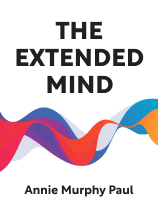

This article is an excerpt from the Shortform book guide to "The Extended Mind" by Annie Murphy Paul. Shortform has the world's best summaries and analyses of books you should be reading.
Like this article? Sign up for a free trial here.
What does it mean to listen to your body? How does listening to your body improve your cognitive skills?
According to Annie Murphy Paul’s book The Extended Mind, actively engaging with your body means learning how to listen to your body’s subconscious knowledge. Paul argues that listening to your body unlocks a more expansive way of thinking.
Read on to learn how to listen to your body to improve your cognitive skills, according to Paul.
Enhancing Cognition by Listening to Your Body
According to science writer Annie Murphy Paul, you can use external aids to enhance your cognition by actively engaging with your body. In The Extended Mind, she writes that, if you listen to your body by paying attention to how your body feels and how you’re choosing to move it, you can access a more expansive way of thinking.
In this article, we’ll examine Paul’s strategies for how to listen to your body to think more effectively.
Unlock Your Subconscious Knowledge
Paul asserts that by becoming more sensitive to how your body feels, you can access a wealth of quick and accurate subconscious knowledge. The brain perceives and stores vastly more information than you’re aware of, and it understands far more complex and subtle patterns than you can consciously grasp. This subconscious information manifests as an intuition you can feel in your body as subtle physical sensations.
Consequently, research has shown that people with greater bodily awareness display instinctive skills in cognitively demanding domains. In one study, researchers found that financial traders who could more accurately report the rhythm of their heartbeat made more profitable decisions than traders who were less aware of their bodies.
(Shortform note: Contrary to the outcome of this study, Mark Douglas argues in Trading in the Zone that the most successful traders entirely ignore the instinctual signals their bodies give them while making trading decisions—particularly emotional signals. Douglas claims that 95% of trading errors occur because traders are too afraid of losing money, and they let this fear compel them into making irrational decisions. To avoid situations in which you mistake your irrational fears for subconscious intuition, Douglas advises practicing purely logic-based trading in which you follow a system of unchanging rules that dictates all your trading decisions.)
Listening to your body has other benefits, too. Paul reports research showing that people with more bodily awareness possess greater emotional intelligence. Why? Because of how emotions form. When you perceive a stimulus, physical sensations manifest in your body; then, your brain’s interpretation of those physical sensations creates emotions. By cultivating greater awareness of bodily sensations, you can consciously influence how your brain interprets those sensations and creates emotions. This allows you to exert some degree of control over your emotions from moment to moment.
(Shortform note: Another theory, the James-Lange theory of emotion, shares Paul’s premise that you create emotions by interpreting your physical responses to stimuli—however, this theory disagrees with Paul’s claim about controlling your emotions. The James-Lange theory contends that all emotions are caused by unique physiological experiences, so it’s impossible to reinterpret the sensations of one emotion as a totally different one. Thus, if you want to improve your emotional regulation, you may be more successful with biofeedback training. This involves learning specific techniques to directly control your physiology, such as deep breathing in response to a stress-induced jump in heart rate.)
To get better at listening to your body, Paul recommends practicing mindfulness meditation. In particular, including a “body scan” in your meditation, in which you take time to focus on how each part of your body feels in turn, helps you develop a greater sensitivity to your bodily sensations. Additionally, it helps to keep a special journal to track the decisions you make every day and how your body feels when you make them. By reflecting on which gut feelings lead to positive outcomes, you may realize which gut feelings you can trust and which you should ignore.
(Shortform note: Mindfulness meditation and journaling both help you build bodily awareness—and they’re two of the most psychologically healthy habits you can practice—because they have one big thing in common: They both involve directing attention toward your consciousness. You’re focusing on your thoughts and feelings rather than solely thinking and feeling about the external world, which is a unique practice in daily life. Therapy is another effective way to build self-awareness for this same reason—a therapist prompts you to observe yourself. Furthermore, observing yourself helps you notice and accept your thoughts and feelings without judgment, which is psychologically healthy.)

———End of Preview———
Like what you just read? Read the rest of the world's best book summary and analysis of Annie Murphy Paul's "The Extended Mind" at Shortform.
Here's what you'll find in our full The Extended Mind summary:
- Why you don't need to withdraw into your mind to achieve optimal cognition
- Cognitive strategies and habits that will help you better understand complex ideas
- How gesturing with your hands helps you think better






